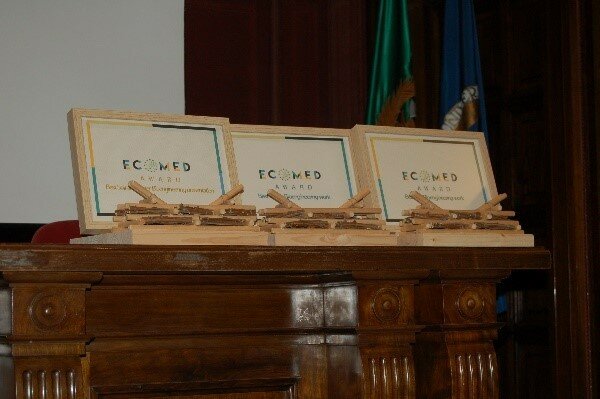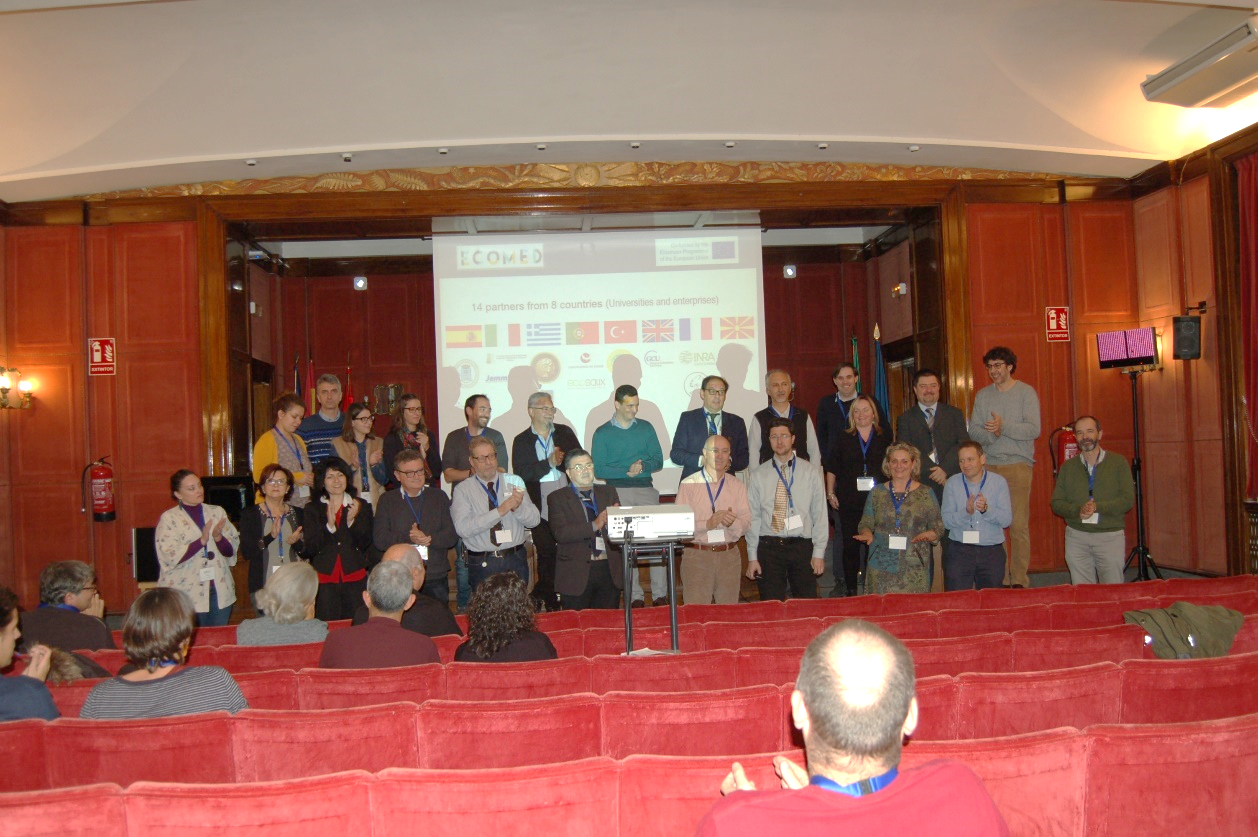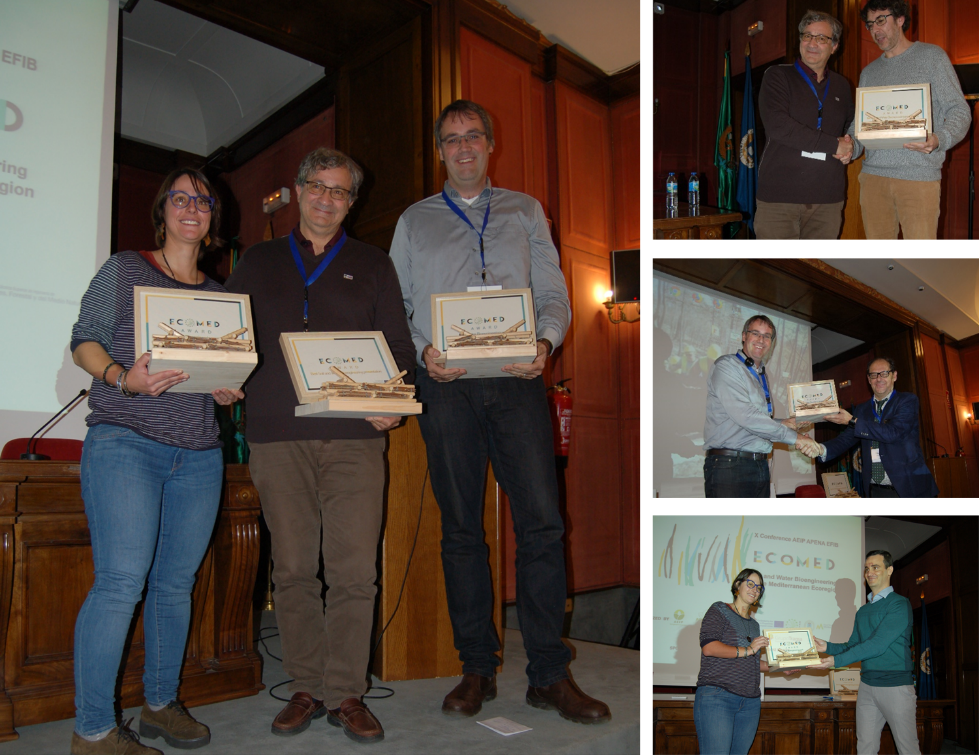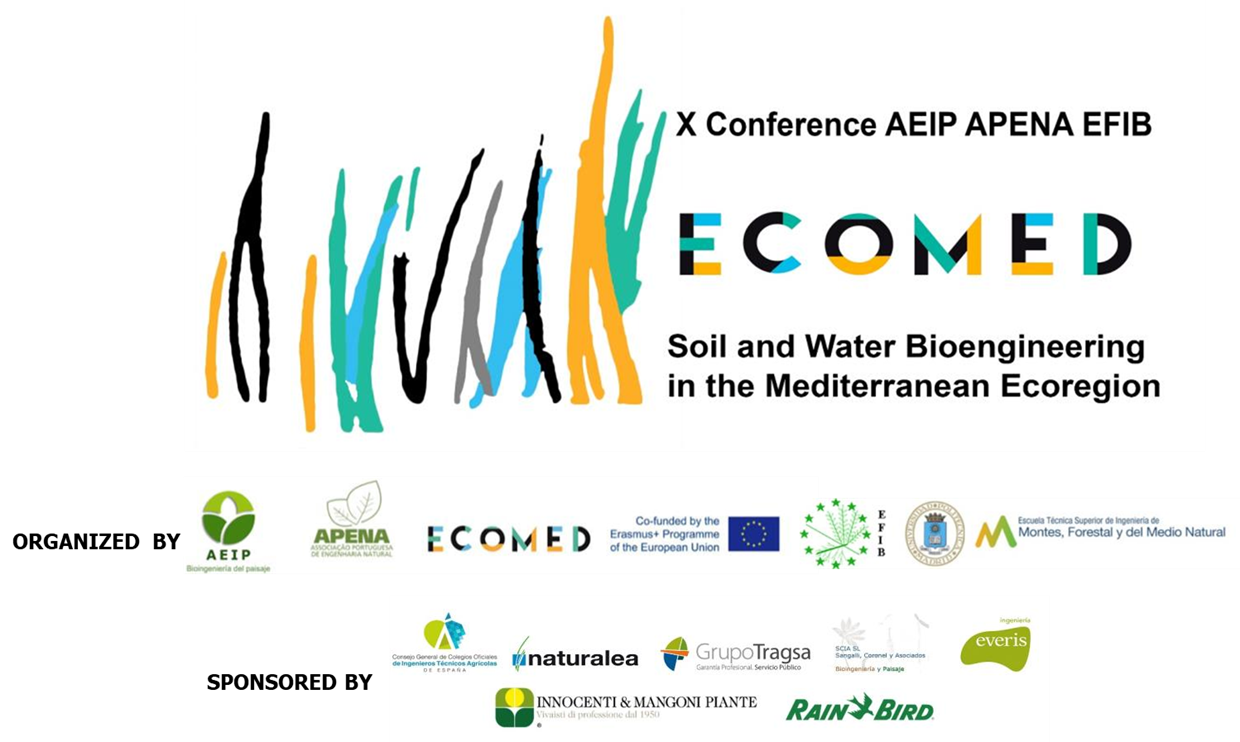Authors: Paola Sangalli ( EFIB ) and Guillermo Tardío ( Ecomed ).
Collaborators : Albert Sorolla ( AEIP) Jose Luis García ( UPM) Carla Rolo ( APENA )

Last November, the days 21st, 22nd and 23rd the X Congress AEIP APENA EFIB was held at the Higher Technical School of Forest Engineers y and Natural Environment as the closing act of the Erasmus + ECOMED Project. More than a hundred people of thirteen different nationalities attended the event and gave their opinion and ideas about the main topic of the conference: the Soil and Water Bioengineering in the Mediterranean area.
Along with the keynote speakers, twelve selected papers were presented, among which the ECOMED awards were selected for the best work in Soil Bioengineering, the best work in Water Bioengineering and, the public prize for the best presentation as well as the special mention of the project ECOMED
In the following paragraphs, a brief review of the conference contents as well as its main conclusions is presented.
The conference inauguration was in charge of the organizers of the event: D. Jose Luis García (UPM- and ECOMED project coordinator); Albert Sorolla (AEIP); Carla Rolo Antunes (APENA) and Paola Sangalli (EFIB).

The conference was composed by five sessions, the first one was focused on the main theme of the conference: Soil and Water Bioengineering in the Mediterranean area. This session was attended by representatives of three of the main Bioengineering associations in the Mediterranean area: Albert Sorolla – AEIP president, Carla Rolo Antunes, APENA president and, Paolo Cornelini, AIPIN vicepresident.
The main conclusions reached in this session are the following:
1-Landscape bioengineering is a technology that solves many of the problems of coexistence between humans and their environment as a real alternative to classical engineering. In the Mediterranean environment, it is necessary to adapt the techniques to the particular situation of the project scope, adapting both the structures and the plant species, as well as the implantation techniques. Only with these adjustments are the techniques effective and the best alternative for the stabilization , erosion control and integration of the works
2- The Bioengineering project starts from the knowledge as a concept, analyzing the relationships between the ecosystemic components, and finding the causes of their degradation to DECIDE, establishing, in a clearly way, the project objectives, both technical and ecological, landscape and socioeconomic, acting in accordance with the deontological principles that determine a suitable objective in harmony with the ecosystem. The correct choice in project must therefore be based on the technical knowledge and deontological principles
The second session was dedicated to slope stabilization where six communications selected in this area along with the one of the invited Speaker José Francisco Martín Duque (UCM) were presented. This latter one dealt on geomorphological restoration: ‘natural’ river basins as basic design units In concrete examples of restoration in the mining sector were shown.
The main conclusions reached in this session are the following:
3-The restoration of natural spaces requires multi and interdisciplinary participation, being necessary the incorporation and synergy of the different tools, integrating the hydromorphological restoration approach with techniques of landscape bioengineering and more traditional restoration techniques, being aware that the final objective is the attainment of functional ecosystems, in balance and with the greatest possible biodiversity, although it is not necessarily possible to achieve the regeneration of the original ecosystem. There are great possibilities for collaboration and exchange of knowledge and experience in the bioengineering sector.
The third session was dedicated to Water Bioengineering which is the Bioengineering related to the fluvial, lagoon and coastal environment. The Manzanares Project was presented by Fernando Magdaleno (DGA-MITECO) and Tasio Fernández Yuste (UPM) with the introduction of Francisco Javier Sánchez( MITECO). This ambitious project pursues a significant restoration of an important strech of the Manzanares River.
As a conclusion of this session in fluvial area the following can be highlighted:
4- Fluvial rehabilitation projects require, in addition to engineering, science and management of the empathy and enthusiasm of all the professionals involved, a multidisciplinary interaction, an active public participation, the necessary dissemination exercise, as well as an adaptive management , recognizing with humility that the solution is not always unique and absolute, and the responses of the system must be permanently evaluated.
From Central Europe , where the Soil and Water Bioengineering techniques a greater tradition, two conferences were presented, one by Hans Peter Rauch (Boku -Austria) and the other by Rosemarie Stangl (Boku-EFIB) who addressed the challenges of this discipline and its relation to Nature-based solutions ()NBSs).
The main conclusions of these presentations are:
5- Bioengineering is considered as a very useful tool when looking for compromise solutions between the mitigation of natural risks and the ecological improvement of the intervention areas. Likewise, the bioengineering approach allows facing the current ecological and climatic challenges, being, actually, Nature Based Solutions (NBS) that allow the regeneration of ecosystems and, therefore, of ecosystem services, being in the base of the construction of the green infrastructures as much in urban area as in the periurban one.
This type of interventions are more comprehensive, they respond to manifold problems and multiple ecosystem services are sought, apart from the functions of erosion control and stabilization of hillsides and / or riverbanks.
6- Landscape Bioengineering solutions are adequate solutions in the adaptation to climate change because, although they require energy for construction, the net balance is positive thanks to the use of plant material and/or proximity materials, saving energy compared to conventional engineering structures.
The last session was dedicated to the presentation of the main conclusions of the ECOMED project, Erasmus + project, which was closed at this conference. For two years, the fourteen members of the project have worked with the common goal of creating a stable alliance among the Academia and the companies, which were present with stands during the conference. The objective of this project was to generate specific theoretical and practical tools for supporting the specialization process of the Soil and Water Bioengineering sector. During the session the main products of the project were presented: Training courses, vegetation database, the Ecomed Awards and, well the possibilities of the continuity of the project (the long term strategy and alliance of the project). This session was coordinated by Jose Luis García (UPM) as the project coordinator.

Members of the ECOMED Project
Conclusions of the last session:
7- The Soil and Water Bioengineering is increasingly well received within the business world, administration and academia, as it has been proven during the realization of the ECOMED project. It is still necessary to disseminate the benefits and possibilities of the Soil and Water Bioengineering techniques and, for this, the evolution of the knowledge triangle of the sector is key, consisting of education centers, research centers and professionals who design and execute the solutions. The combination of ECOMED and the existing professional associations represented by the European Federation of Landscape Bioengineering, EFIB, offers very good synergies and possibilities to move forward in this direction
The conference closure was done by D. Alberto Garrido, UPM vicerector, Germán Glaría (Director of the Forestry School of the UPM), Francisco Javier Sánchez (Water Agency bureau) y Jose Luis García (General coordinator of the Ecomed project).
Finally, the Ecomed Awards were given. Two prizes were selected by the scientific committee and a thrid one was selected by the conference attendees.
The Ecomed Awards can represent a useful tool for incorporating the Mediterranean realm within the soil and water bioengineering symposia and conferences.

Premios ECOMED / ECOMED Awards
- José Luis García (UPM) gave the water bioengineering Award to Henning Günter for his work in “Applications and potentialities of floating blue-green infrastructures.
- Martín Giménez (UPM) gave the Soil bioengineering Award to Gina Sorolla for her work in “Log crib wall and wooden flooring in the cemetery of Roques Blanques (El Papiol, Barcelona).
- Guillermo Tardío (SCIA) gave the Award selected by the conference attendees to Gianluigi Pirrera for his work in ‘New scenarios for the ecological restoration works in the fight against desertification processes in Custonaci’.
The scientific committee gave an special mention to the Government of Navarre and GAN-NIL for their fluvial restoration works and the use of soil and water bioengineering works in the H2O GUREA and IREKIBAI projects.
After the Award ceremony, we gave our farewell with the company of the “Tuna de Montes” who gave a friendly ending to the event. We will meet again in 2020.





